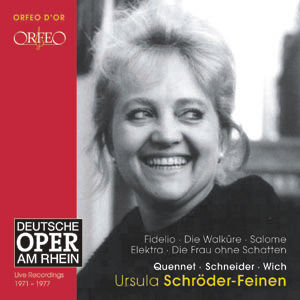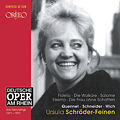ORFEO International – Catalogue
CDs
 | Ursula Schröder-Feinen
OpernhighlightsOrfeo • 1 CD • 68min Order No.: C 599 061 B |
|
Composers/Works: |
L.v. Beethoven: Abscheulicher! - Komm, Hoffnung, laß den letzten Stern (from: Fidelio op. 072)
L.v. Beethoven: Er sterbe! - Es schlägt der Rache Stunde (from: Fidelio op. 072)
L.v. Beethoven: O namenlose Freude (from: Fidelio op. 072)
R. Wagner: Schläfst du Gast? - Der Männer Sippe (from: Die Walküre)
R. Strauss: Ah! Du wolltest mich nicht Deinen Mund küssen lassen, Jochanaan
R. Strauss: Ah, warum hast du mich nicht angesehn? (from: Salome)
R. Strauss: Ah, ich habe deinen Mund geküsst (from: Salome)
R. Strauss: Läßt du den Bruder nicht nach Hause, Mutter? - Was bluten muß? (from: Elektra)
R. Strauss: Orest, Orest! - Es rührt sich niemand! - Nein, du sollst mich nicht umarmen! (from: Elektra)
R. Strauss: Barak, ich habe es nicht getan! (from: Die Frau ohne Schatten op. 065)
R. Strauss: Barak, mein Mann - Mir anvertraut (from: Die Frau ohne Schatten op. 065)
R. Strauss: Nun will ich jubeln wie keiner gejubelt (from: Die Frau ohne Schatten op. 065)
|
Artists: |
Ursule Schröder-Feinen (Sopran)
Ernst Kozub (Florestan - Tenor)
Peter Wimberger (Don Pizarro - Bariton)
Peter Meven (Rocco - Baß)
Wolf Appel (Jaquino - Tenor)
Gerd Brenneis (Siegmund - Tenor)
Wilhelm Ernest (Herodes - Tenor)
Astrid Varnay (Herodias - Mezzosopran)
Siegmund Nimsgern (Orest - Bariton)
Hildegard Behrens (Kaiserin - Sopran)
Linda Karén (Amme - Mezzosopran)
Matti Kastu (Der Kaiser - Tenor)
Gerd Feldhoff (Barak, der Färber - Bariton)
Zenon Kosnowski (Der Einäugige - Baß)
Peter Brunsmeier (Der Einarmige - Baß)
Heinz Leyer (Der Bucklige - Tenor)
Cornelia Berger (Stimme vom Himmel - Alt)
Orchester der Deutschen Oper am Rhein (Orchester)
Günter Wich (Dirigent)
Peter Schneider (Dirigent)
Arnold Quennet (Dirigent)
|
There are voices that overwhelm the listener like a force of nature. 
Ursula Schröder-FeinenAnd there are others that are capable of affecting us on the deepest emotional level. It is very rare for a singer – especially a hochdramatisch soprano – to combine these qualities, but one such exception was Ursula Schröder-Feinen. Anyone who heard her onstage as Elektra, the Dyer’s Wife or as Beethoven’s Leonore was overwhelmed by the sheer splendour of the sound but was also profoundly moved by the sincerity and innocence of her singing. It is all the more remarkable, therefore, that she made no official recordings and that until now only unauthorized live recordings of her appearances have circulated on the „grey“ market. We are pleased to be able to release the first authorized solo recording of Ursula Schröder-Feinen. It contains live material from the Deutsche Oper am Rhein and at the same time is a special contribution to mark the fiftieth anniversary celebrations of a company that was founded in 1956.
Technically speaking, these recordings admittedly leave something to be desired, and yet in spite of this they convey a powerful impression of Ursula Schröder-Feinen’s singing. Even in the recitative to Leonore’s „Abscheulicher! Wo eilst du hin?“, the listener can already sense the singer’s ability to fill the theatre with a voice as strong in its middle and lower registers as at the top of its range. One track that benefits in particular from this rich middle register is Sieglinde’s Narration, the low-lying phrases of which are often a problem for other sopranos. Ursula Schröder-Feinen is also completely in her element with the three Strauss roles represented here:
Salome, Elektra and the Dyer’s Wife.
The present excerpts from a 1973 performance of Elektra at the Deutsche Oper am Rhein recall the first release featuring this company’s work, a release that included excerpts from two performances of Elektra in 1964. In these earlier performances the title role was taken by Astrid Varnay, who appears here as Klytämnestra. The confrontation between mother and daughter in the persons of Varnay and Schröder-Feinen was one of the high points of the German operatic scene of the 1970s, not only at the Deutsche Oper am Rhein itself but also in Berlin, Hamburg and Munich.
|